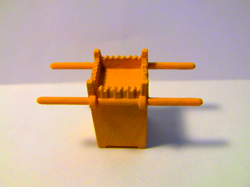Sanctuary Lesson 12 - The Altar of Incense
As we stand with the priest in the Holy Place, we observed the table of shewbread and marveled at the light given out by the seven-branched candlestick. We suddenly realize there is a sweetly fragrant aroma in the air. Where is it coming from? We then notice an altar of incense.

Let's turn to Exodus 30:1.
- According to these verses, where was the altar of incense located?
- Answer (highlight to read): The altar of incense was located (in the Holy Place) before the veil that is by the ark of the testimony, before the mercy seat.
- According to these verses, what was the altar of incense made of?
- Answer: The altar of incense was made of acacia wood overlaid with gold.
God specified to Moses the exact location of the altar of incense in the Holy Place to teach us the importance of the its ministry. The priest who ministered at the altar of incense would be the closest to the mercy seat without stepping into the Most Holy Place (which only the High Priest was allowed to do once a year).
The construction of the altar itself whispers to us the mystery of godliness (1 Timothy 3:16). Jesus Christ is simultaneously both God and man. The gold pointed to Jesus' glorious and Godly nature, while the wood pointed to Jesus' frail human nature. It is because Jesus took on human nature and came down to earth, living the perfect life, and dying the death we deserve, that He is able to be the perfect high priest to intercede on our behalf (Hebrews 2:17).
Let's turn to Exodus 30:7-8.
- According to these verses, what was burned on the altar of incense and how often?
- Answer: Sweet incense was burned on the altar of incense every morning and evening.
We learned in the lesson on the Holy Place that the incense symbolizes our prayers to God (Psalms 141:2-3). The altar of incense reminds us the importance of praying to God every day, morning and evening. We can pray to God, thank Him for all that he has done, confess our sins, and ask Him petitions on the behalf of others. There is no limit to how many times we can approach God in prayer! The earnest prayers of God's people ascend to His throne and please Him, just like the aroma of the incense.
Let's turn to Number 16:18, 35 and 2 Chronicles 26:16-21.
- According to these verses, did God allow just anyone to minister at the altar of burnt offering?
- Answer: No
Not even a mighty king can come to the altar of incense to burn his own man-made incense. Uzziah was struck with leprosy for his arrogance, which mirrored what was in his heart (Psalms 66:18). Only a consecrated priest may be allowed to perform such a sacred activity. It is no small privilege then, that once we are born again into Christ's family (1 Peter 2:9) that we can send our prayers directly to God and He will hear us (Isaiah 30:19)!
You may be asking yourself, can any kind of incense be used on the altar on incense? Let's turn to Exodus 30:34-38 and Leviticus 10:1-3.
- According to these verses, did God allow just any kind of incense to burned on the altar of incense?
- Answer: No
- Answer: Sweet spices, stacte, onycha, galbanum, sweet frankincense, and salt
Stacte was a strong and bitter spice. What might be the most bitter part of prayer? Perhaps that would be the confession of our own sins (Ezra 10:1; Daniel 9:4) and the realization that our own righteousnesses are as filthy rags (Isaiah 64:6). However unpleasant this task, we must confess. Take heart, though;s God is faithful to forgive our sins as we confess each and every one of them to Him (1 John 1:9).
Onycha was used as a vehicle by perfume makers to intensify and prolong the fragrance given off by crushed flowers and resins. What part of prayer would intensify our love for Jesus? Perhaps that would be thanksgiving and praise, as we recount all that God has done for us in our lives and promises to do for us in the future (Ephesians 5:20; Philippians 4:6).
Galbanum gives a zesty and stimulating aroma, especially mixed with the other ingredients. It also can improve and preserve the aromas of the other ingredients. What part of prayer could this ingredient be symbolic of? Perhaps galbanum embodies the persistence of prayer, to keep praying and praying even when there is seemingly no answer in sight (1 Thessalonians 5:17; Luke 18:1-8).
Frankincense was a white resin that produced a powerfully sweet fragrance when burned, able to cover bitter and acrid aromas. The scent of frankincense could be especially smelled in the springtime. Perhaps this ingredient teaches us of the purity and overcoming power of Jesus as our Savior (John 14:13-14)?
Friend, as you study the altar of incense, think about how you pray. Is your prayer more than just a mere ritual? Is it a earnest, heartfelt communication to the living God, the almighty Creator of the universe? Do you thank God for all the blessings He has given you? Do you praise God for His loving character, His long-suffering and patience with us? Do you come to God humbly, confessing your sins and asking for the divine strength to overcome them and turn away from them forever? Do you come to God with your petitions and ask for His help in all aspects of your life? Do you thank Him again for the gift of life? Do you praise Him again for all the small miracles He has done, things most people wouldn't even notice?
Friend, it is my desire that you see what a blessing and privilege prayer is. I invite you to pray with fervent hope and urgency. As we close this lesson, let us remember the model prayer Jesus taught is disciples in Matthew 6:9-13:
In this manner, therefore, pray: Our Father in heaven, hallowed be Your name. Your kingdom come. Your will be done on earth as it is in heaven. Give us this day our daily bread. And forgive us our debts, as we forgive our debtors. And do not lead us into temptation, but deliver us from the evil one. For Yours is the kingdom and the power and the glory forever. Amen.

